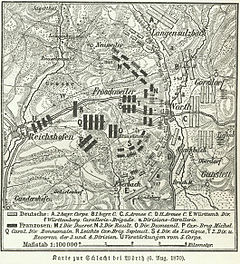Battle of Wörth
| Battle of Wœrth/Frœschwiller | |||||||
|---|---|---|---|---|---|---|---|
| Part of the Franco-Prussian War | |||||||
 |
|||||||
|
|||||||
| Belligerents | |||||||
|
|
|
||||||
| Commanders and leaders | |||||||
|
|
|
||||||
| Strength | |||||||
| 75,000 infantry 6,000 cavalry 300 guns |
50,000 infantry 4,850 cavalry 101 guns |
||||||
| Casualties and losses | |||||||
|
10,640 9,270 dead or wounded 1,370 missing |
~20,000 ~8,000 dead or wounded ~12,000 missing or captured |
||||||
The Battle of Wörth, also known as the Battle of Reichshoffen or as the Battle of Frœschwiller, refers to the second battle of Wörth, which took place on 6 August 1870 in the opening stages of the Franco-Prussian War. (The first Battle of Wœrth occurred on 23 December 1793 during the Napoleonic Wars.) In the second battle, troops from Germany commanded by Crown Prince Frederick and directed by his Chief of Staff, General Leonhard Graf von Blumenthal, defeated the French under Marshal Mac-Mahon near the village of Wœrth in Alsace, on the Sauer River, 10 km north of Haguenau.
During 5 August 1870 the French were concentrated in a selected position running nearly north and south along the western banks of the Sauer on the left front of the German III army, which was moving south in an attempt to find them. The French position was marked from right to left by Morsbronn, the Niederwald, the heights west of Wœrth and the woods northeast of Frœschwiller. East of the Sauer the German III army was moving south towards Haguenau, when their cavalry found the French position about noon. Thereafter the German vedettes held the French under close observation, while the latter moved about within their lines and as far as the village of Wœrth as if in peace, notwithstanding the defeat of a portion of the French army at the Battle of Wissembourg on the previous day. The remnant of the force which had been engaged there, with many of its wounded still in the ranks, marched in about noon with so soldierly a bearing that, so far from their depressing the morale of the rest, their appearance actually raised it.
...
Wikipedia
